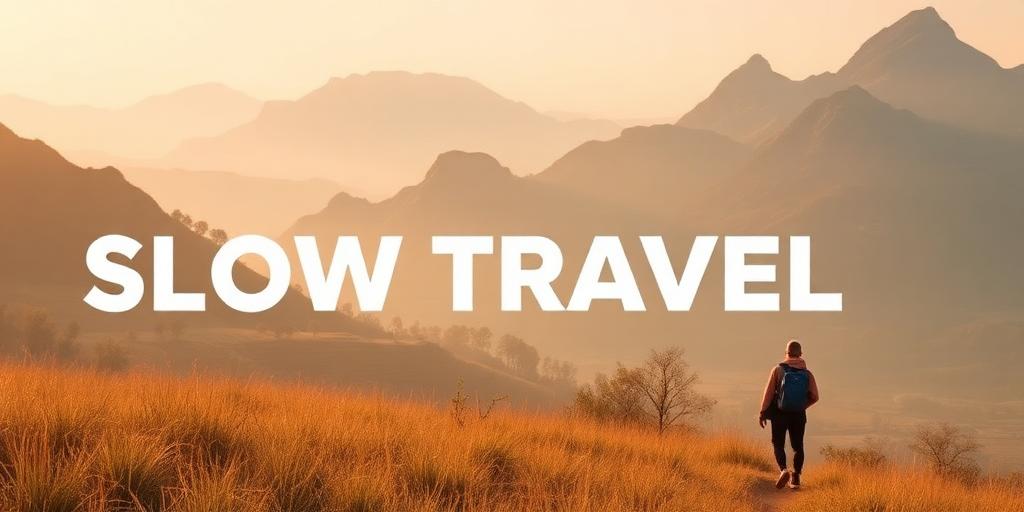The Rise of "Slow Travel" and Immersive Cultural Experiences
In an era defined by instant gratification and fast-paced living, a counter-movement has been steadily gaining traction: slow travel. This approach emphasizes a deliberate pace, deep immersion in local culture, and meaningful connections over ticking off destinations on a checklist. Unlike conventional tourism that often prioritizes seeing as much as possible in a limited time, slow travel encourages a more mindful and enriching experience.
What is Slow Travel?
Slow travel is about quality, not quantity. It's about savoring the journey, connecting with locals, and leaving a positive impact on the communities visited. This can manifest in various ways, from spending weeks in a single region to choosing eco-friendly transportation options and supporting local businesses.
Key Characteristics of Slow Travel:
- Deliberate Pace: Instead of rushing from one attraction to another, slow travelers take their time, allowing for spontaneous discoveries and deeper exploration.
- Cultural Immersion: Engaging with local traditions, cuisines, and customs is central to the slow travel experience. This could involve taking a cooking class, learning a few phrases in the local language, or participating in community events.
- Sustainable Practices: Slow travel often aligns with sustainable tourism principles, emphasizing responsible consumption, reduced environmental impact, and support for local economies.
- Meaningful Connections: Building relationships with locals and fellow travelers is a key aspect. This fosters a sense of community and provides unique insights into the destination.
Benefits of Embracing Slow Travel
Opting for slow travel offers a multitude of advantages:
- Deeper Cultural Understanding: Spending more time in a place allows for a more nuanced understanding of its history, culture, and people.
- Reduced Stress: The slower pace reduces the stress associated with travel, allowing for greater relaxation and enjoyment.
- Environmental Benefits: Choosing sustainable transportation and supporting local businesses helps minimize the environmental impact of travel.
- Enhanced Personal Growth: Stepping outside of one's comfort zone and engaging with different cultures can lead to personal growth and broadened perspectives.
Immersive Cultural Experiences: A Cornerstone of Slow Travel
Immersive cultural experiences are integral to the slow travel philosophy. These experiences go beyond superficial sightseeing and involve actively participating in local life.
Examples of Immersive Cultural Experiences:
- Homestays: Staying with a local family provides an intimate glimpse into their daily lives and traditions.
- Volunteer Tourism: Contributing to a local cause or project offers a chance to give back to the community and connect with locals on a deeper level.
- Artisan Workshops: Learning traditional crafts from local artisans provides insight into the region's artistic heritage.
- Food Tours: Exploring the local cuisine through guided food tours can reveal the cultural significance of different dishes and ingredients.
How to Plan a Slow Travel Trip
Planning a slow travel trip requires a different approach than traditional travel planning.
- Choose a Destination Wisely: Select a destination that offers a rich cultural experience and opportunities for exploration.
- Prioritize Quality over Quantity: Focus on a smaller area and delve deeper into its culture and history.
- Embrace Spontaneity: Allow for unplanned detours and unexpected discoveries.
- Connect with Locals: Seek out opportunities to interact with locals, whether through homestays, community events, or local tours.
- Travel Sustainably: Choose eco-friendly transportation options, support local businesses, and minimize your environmental impact.
The Future of Travel: A Shift Towards Slow and Meaningful Experiences
As travelers become more conscious of the impact of their choices, the demand for slow and immersive travel experiences is likely to continue to grow. This shift towards more meaningful and sustainable travel promises a future where tourism benefits both travelers and the communities they visit. By embracing the principles of slow travel, we can transform our journeys into opportunities for learning, connection, and positive change.









